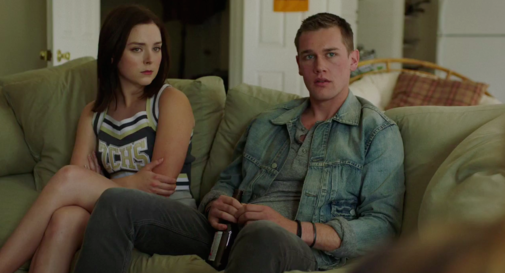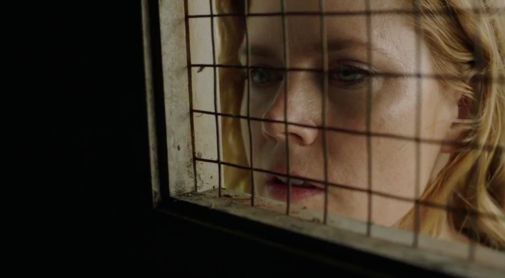Sharp Objects: Episode 3 "Fix"
 Monday, July 23, 2018 at 10:00PM
Monday, July 23, 2018 at 10:00PM Previously: Episode 2 "Dirt"
by Ilich Mejía
In this week's episode of Let's Obscure Patricia Clarkson's Face To Visually Storytell, we barely get to make out Patty's moneymaker. In all fairness, while obscured, Patricia's unreasonable Adora still gets to crush common sense with pastels and Southern charm in front of characters outside her own family this week. Out of a familial context, her obsession with perception is amplified to a chilling perversity as she willfully obstructs her daughter Camille's attempts at finding the murderer of two young girls because *gasp* what will people say! We see how even at home, protected from the scrutiny of people outside of her circle, she prioritizes presentation: heels with nightgowns before bed, suede sandals while gardening, a maid never seen without her uniform. She’s no different with less familiar acquaintances, winning over the local police chief and the grieving father with her facetious attention and sweetened coffee...
"Fix" focuses on all of the attention characters neglect to give themselves despite clear signs shrieking for self-care. Adora and Amma have both disregarded their best interests so blindly, they are both shocked when others take interest in their well-being. "Why are you being sweet to me?" Amma asks Camille after she helps sneak her into their house drunk. Amma says this just a few breaths before fetishizing Camille’s work (“You love dead girls”) in a misguided attempt to bond with her sister. Adora has a similar response to commiserating about her mothering with her husband. "You're good to me, Alan" she kindly directs his way before shutting down his invitation to share her room for the night.
If Mad Men's mantra was "people hear what they want to hear", this show's is "people see what they want to see". Adora’s parenting exemplifies this best. She brushes her daughter Amma’s hair as she listens to her admitting how much she threw up the night before without considering it might have been due to drinking. She sees her later out of her below-the-knee debutante drag and doesn’t question it’s merely Amma “playing dress-up”. The local police officer tells her he’s seen her cavorting with her friends at pig chases after curfew, but her instinct is to blame her eldest Camille. Who’s also to blame for stabbing herself with a rose thorn because she says so.
 “Nothing’s ever your fault, is it?” Adora projects so much onto Camille, she’s an IMAX.
“Nothing’s ever your fault, is it?” Adora projects so much onto Camille, she’s an IMAX.
Except here, it’s Camille that’s doing the most to take responsibility for herself. Her arc is told through two timelines, one so detached from the current happenings that it could have happened in her head or in the far past. It’s the latter, where she meets Alice, a ghost of her past that’s now reappearing as visions of the Woman in White that some of Wind Gap’s children suspect raptured at least one of the now-murdered girls. Alice and Camille’s relationship is so protected from the recent tragedies of Wind Gap that it feels foolish when you don’t predict its inevitable end.
"Abusing yourself is also abusing others" reads a sign in the mental health facility where Camille and Alice bond over their self-injury. Alice’s mother is ashamed of her behavior; Camille can’t wear skirts anymore. Despite being older, Camille snubs taking on the mother figure role Alice so desperately craves. Instead, she accepts an escape to music that Alice offers which explains her now used-up iPod. The show’s editing—relying heavily on the music that this duo depends on to survive—continues to beguile, daring the viewer not to blink between cuts. It conditions the viewer to become familiar with the frequent roses and their red so we are less accosted and more betrayed when the hue bleeds out of Camille’s arms as she discovers Alice’s lifeless body. As Nathaniel pointed out last week, the show continues to struggle to paint Camille’s condition subtly, but her inebriation was adorned with warm smiles this week as she remembers her time with Alice fondly.
Camille continues to make strides with her unofficial investigation, to her mother's chagrin. Until she's interrupted, she establishes a trusting relationship with the father of Ann, the first victim of the recent Wind Gap child murders. She even benefits from a teenager's thirst for attention as she links Camille with her boyfriend John, the brother of the second victim, Natalie. Ashley, the teenager, greets Camille wearing a cheerleading uniform even though school is out. In a tableau that resembles Big Little Lies first therapy scene, Ashley sits next to her boyfriend as Camille begins to question him. Like the scene it resembles from Lies, the female in question tries to sell the story she wants to be true while the male undermines it with actual fact, regardless of how guilty it makes him look.
 "What brings you here today, Mr. & Mrs. Wright?"
"What brings you here today, Mr. & Mrs. Wright?"
Chief Vickery and Detective Willis can't agree on who to blame for the recent murders because Vickery's bigotry has convinced him it must have been a trucker or a "fucking Mexican", but they both agree only a man could have been strong enough to pull this off. The complicated women in this town underscore the absurdity of that notion. Simplyfing two murders to teeth-pulling would be like simplyfying Adora to her predilection for roses.
Some more thorns:
- Is Conrad GraysonAlan's muffled screaming at the end provoked by the heartbreaking realization that his beautiful TV wives just aren't that into him?
- "That boy from Kansas City talks like a woman from Wind Gap" would be a solid burn if it wasn't for the deeply misogynistic undertones, Chief.
- I was rooting for Amma, but after threatening the perfection of Amy Adam's hopefully-insured hair with a sticky lollipop, I'm on the fence.
"Black, coffee, winter." is a semi-solid answer to Detective Willis' favorite color, favorite ice cream, favorite season poll. What gets your vote?




Reader Comments (6)
You forgot to mention the odd scene of when Amma went to the pig farm and Camille followed her. So weird.
The casting of the teens is ridiculously good...it's interesting to see the difference in depth here than on a teen show like Pretty Little Liars or Riverdale. The girl who plays Amma is able to portray so many different things at once.
This one was upsetting because of * spoiler * the flashbacks of Amy in a mental ward, her step sister being mean, and the mom and stepdad being revealed as abnormal. It’s a little like True Blood without the camp? And I’m sorry but if Chris Messina was in my town he would not be lonely. Hot man.
I love the show! It’s intriguing, well crafted and the acting it’s sooo good!!! I love the odd relationship of Adora and Camille.
I'm enjoying the pass-the-baton series review. New insights/perspectives every week on a show that invites close watching. Thanks, Team!
Amy's best work since American Hustle IMHO.
Thanks so much for your review of Sharp Objects. I am definitely tuning in each week, even though each episode seems to pose more questions than it answers. Amy Adams is wonderful, and I agree that it's her best work since American Hustle, although to me it may be even better than AH. I go along from episode to episode being confused, but still loving the uncertainty of it all. It's a much darker show than Big Little Lies. It's making me want to read the book after the show is over. I love it!